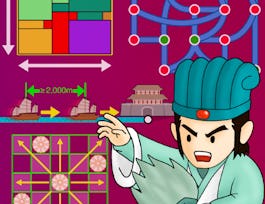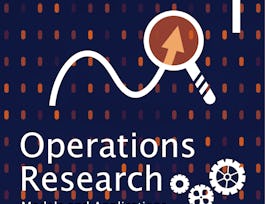Tired of solving Sudokus by hand? This class teaches you how to solve complex search problems with discrete optimization concepts and algorithms, including constraint programming, local search, and mixed-integer programming.


Discrete Optimization
Taught in English
Some content may not be translated
71,961 already enrolled
Course
Gain insight into a topic and learn the fundamentals


Instructors: Professor Pascal Van Hentenryck
(757 reviews)
Skills you'll gain
Details to know

Add to your LinkedIn profile
See how employees at top companies are mastering in-demand skills


Earn a career certificate
Add this credential to your LinkedIn profile, resume, or CV
Share it on social media and in your performance review

There are 8 modules in this course
These lectures and readings give you an introduction to this course: its philosophy, organization, and load. They also tell you how the assignments are a significant part of the class. This week covers the common input/output organization of the assignments, how they are graded, and how to succeed in this class.
What's included
4 videos2 readings1 programming assignment
These lectures introduce optimization problems and some optimization techniques through the knapsack problem, one of the most well-known problem in the field. It discusses how to formalize and model optimization problems using knapsack as an example. It then reviews how to apply dynamic programming and branch and bound to the knapsack problem, providing intuition behind these two fundamental optimization techniques. The concept of relaxation and search are also discussed.
What's included
9 videos1 programming assignment
Constraint programming is an optimization technique that emerged from the field of artificial intelligence. It is characterized by two key ideas: To express the optimization problem at a high level to reveal its structure and to use constraints to reduce the search space by removing, from the variable domains, values that cannot appear in solutions. These lectures cover constraint programming in detail, describing the language of constraint programming, its underlying computational paradigm and how it can be applied in practice.
What's included
13 videos1 reading2 programming assignments
Local search is probably the oldest and most intuitive optimization technique. It consists in starting from a solution and improving it by performing (typically) local perturbations (often called moves). Local search has evolved substantially in the last decades with a lot of attention being devoted on which moves to explore. These lectures explore the theory and practice of local search, from the concept of neighborhood and connectivity to meta-heuristics such as tabu search and simulated annealing.
What's included
10 videos1 programming assignment
Linear programming has been, and remains, a workhorse of optimization. It consists in optimizing a linear objective subject to linear constraints, admits efficient algorithmic solutions, and is often an important building block for other optimization techniques. These lectures review fundamental concepts in linear programming, including the infamous simplex algorithm, simplex tableau, and duality. .
What's included
6 videos
Mixed Integer Programming generalizes linear programming by allowing integer variables, which dramatically changes the complexity of the problems but also broadens the potential applications significantly. These lectures review how to model problems in mixed-integer programming and how to solve mixed-integer programs using branch and bound. Advanced techniques such as cutting planes and polyhedral cuts are also covered.
What's included
6 videos1 programming assignment
These lectures cover some more advanced concepts in optimization. They introduce constraint-programming techniques for scheduling and routing.
What's included
2 videos1 programming assignment
These lectures continues to cover some more advanced concepts in optimization. They introduce large neighborhood search, which often combines constraint programming and local search, and column generation which decomposes an optimization model into a master and pricing problem, using more complex variables.
What's included
2 videos1 reading
Instructors


Offered by
Recommended if you're interested in Algorithms

The University of Melbourne

The University of Melbourne

National Taiwan University

The University of Melbourne
Why people choose Coursera for their career




Learner reviews
Showing 3 of 757
757 reviews
- 5 stars
89.44%
- 4 stars
7.78%
- 3 stars
1.18%
- 2 stars
0.13%
- 1 star
1.45%
New to Algorithms? Start here.

Open new doors with Coursera Plus
Unlimited access to 7,000+ world-class courses, hands-on projects, and job-ready certificate programs - all included in your subscription
Advance your career with an online degree
Earn a degree from world-class universities - 100% online
Join over 3,400 global companies that choose Coursera for Business
Upskill your employees to excel in the digital economy
Frequently asked questions
Good programming skills, knowledge of algorithms and linear algebra.
A minimal knowledge of python is necessary to integrate with the course infrastructure. Outside of that, students are free to use any language of their choice.
A motivated student spending the time on the programming assignment will succeed in this class.


